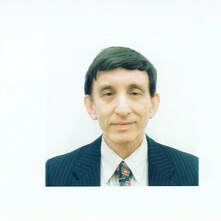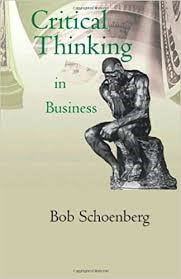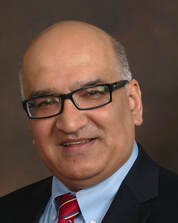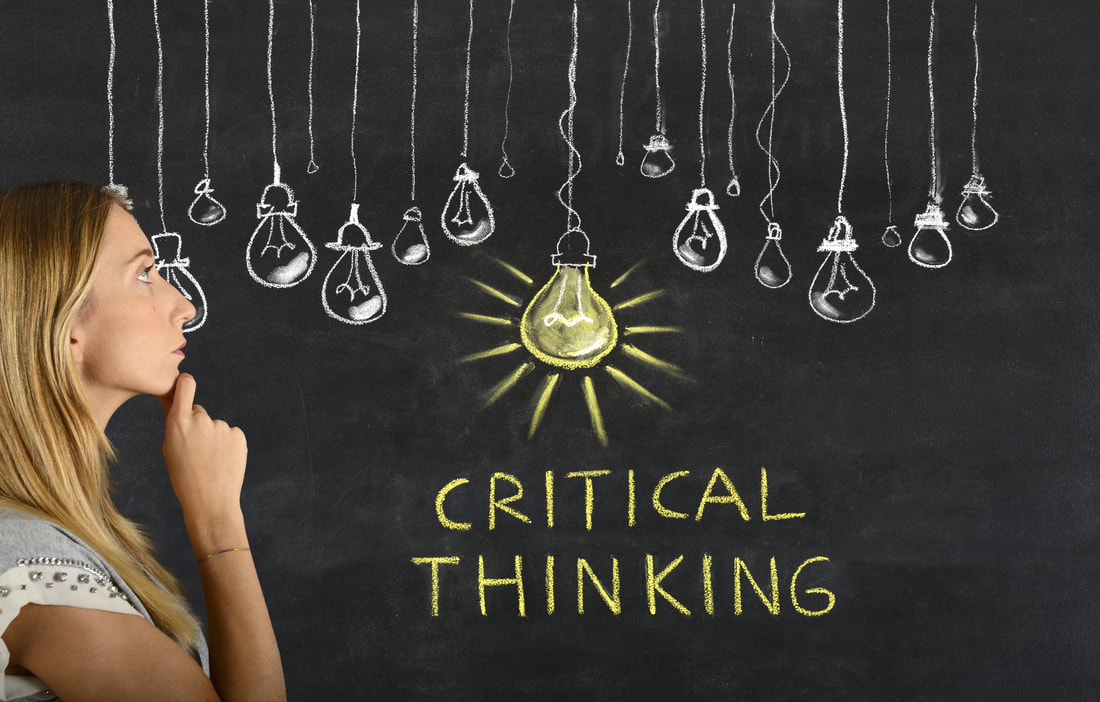 According to business leaders, one of the most important skills for success in business today is critical thinking. Companies value this highly if they want to compete and win. Since we are becoming more dependent on machines, humans often have to think critically so they make critical decisions. If they don't possess this skill, the result can be catastrophic. The problem is that Business schools embed Critical Thinking into the Business curriculum, but do not offer a specific course in Critical Thinking, making it difficult for students to learn this type of thinking. Students place priority on hard skills to get a job out of school and little or none on soft skills like Critical Thinking. They are pretty much on their own to learn it on the job. If you don't master Critical Thinking fast, it is likely to hurt your career since you can't succeed for long as a good business leader without Critical Thinking. Bob Schoenberg noticed this problem when he was an Adjunct Professor at the University of Massachusetts. He taught thousands of students on courses related to developing their critical thinking skills. But what drew my attention to Bob's work was his excellent book Critical Thinking in Business. It is an excellent start for those who want to learn this quickly. Though the book is short, you should use it as a textbook to master it. To learn this skill, you will keep coming back to this book and study it. He has also written a new book Stop Assuming that helps people not fall victim to making assumptions that can backfire. I had the opportunity to talk to Bob about the work he has done and is currently doing. He has an online course that you can take and gives talks and workshops. You can reach Bob at [email protected]. Below are five questions Bob was kind enough to take time out of his busy schedule to answer and since he has such an impressive background that includes being a pianist, teacher, speaker, and writer, I wanted him to recommend five books that have influenced his thinking.  Five Questions Since critical thinking skills are highly valued in job candidates, can you explain how businesses define critical thinking skills that they need in employees to help them achieve their business objectives? The Watson Glaser Critical Thinking Test is the gold standard that businesses use to evaluate a job candidate’s critical thinking skills. However, this test does not focus exclusively on business, and many of the questions have nothing to do with business. A candidate may score high on the test, but it does not measure one’s ability to apply critical thinking skills to business. Conversely, a candidate may score poorly on the test, but still be able to think critically on the job. In general, many businesses value a candidate’s ability to solve problems, which actually involves several critical thinking skills and even some creative thinking skills. The problem with the term “critical thinking” is there are hundreds of different definitions, and there isn’t anyone agreed upon definition. How does a candidate demonstrate critical thinking skills in a job interview? One of the best ways for a candidate to demonstrate critical thinking skills in a job interview is to state that they use several critical thinking skills and give an example of how they would use a specific skill in a business setting. This lets the interviewer know that you know more than just the definition of critical thinking skill. It actually demonstrates that you can use critical thinking on the job. Is critical thinking skills different today due to intelligent machines which we often have to work with? By this I mean we have to defer a lot of our critical thinking skills to machines to make faster decisions. How has this changed in how we think today? While we are becoming more and more dependent upon machines for certain tasks, many of the problems in business involve “human factors” such as personality clashes, distress (emotions that are uncomfortable), various learning styles and management styles. Computers are not programmed to deal with these human factors. However, some critical thinking skills can deal with these issues, such as Methodological Believing which helps to understand an opposing point of view. This is not a skill that is well recognized in the business world but is quite useful and valuable. However, because we have become more dependent upon machines, it has changed how we think. We let the machines do the work for us and sometimes don’t think at all! For example, some high school students don’t know how to use a dictionary. Instead, they just use a computer to find the spelling or meaning of a word. But if the computer goes down, they are helpless. In this respect, some people don’t know how to think in a situation like this. Is critical thinking valued during job interviews but less valued once a person is at work in that politics often trumps critical thinking in just about everything? It varies from one business to another, but I think that politics do often trump over critical thinking and people often get into illogical arguments and use fallacious thinking. A good critical thinking skill to use in situations like this is Fair-mindedness. Using this critical thinking skill, you listen to an opposing point of view even if you don’t agree with it. You also are willing to change your own point of view if you agree with the speaker. How do you measure critical thinking skills? Businesses often use the Watson Glaser Critical Thinking Test. There are other tests designed to measure CT skills. I often have people keep a journal listing what critical thinking skill they used during the week – or could have used. I also have them describe how and why they used or could have used that skill. In a relatively short period of time, an improvement can be seen in their critical thinking ability. One More Question How does one develop and master this skill besides reading your outstanding book? I recommend one take a course in critical thinking and practice and engage in the skills. The Critical & Creative Thinking Program at UMASS, Boston offers both online graduate courses and face to face courses. I offer non-academic courses specifically geared for business people and courses for use in one’s personal life. For more information contact me at [email protected] or email me at [email protected]. Like any skill, you need to practice it. In my courses and workshops, whether online or face to face, I encourage people to collaborate with one another and practice their skills online or in person. Please recommend five books that have influenced your thinking. 1. Think and Grow Rich by Napoleon Hill 2. Law of Attraction: The Science of Attracting More of What You Want and Less of What You Don't by Michael Losier 3. Propaganda by Edward Bernays and Mark Crispin Miller 4. Requiem for the American Dream: The 10 Principles of Concentration of Wealth & Power by Noam Chomsky 5. The Daily Drucker by Peter F. Drucker #####  Jay Oza is a writer, speaker, executive coach. He makes people thrive on high stakes stage whether it's for job interview, sales presentation, entrepreneurship or an important speech. He is the author of the book Winning Speech Moments: How to Achieve Your Objective with Anyone, Anytime, Anywhere. He was recently honored with an award by Hire Heroes USA for his outstanding volunteer work with military veterans and their spouses get good high-paying jobs when transitioning from military to civilian life. Please download the speech checklist and the speech workbook to help you with your next high stakes speech. You can get more information at www.winningspeechmoments.com. You can contact him at [email protected] or 732-847-9877. If you have a high stakes event (job interview, sales meeting or a big speech) coming up soon, please contact him right away that is if you want to win.
1 Comment
|
AuthorJay Oza Archives
July 2024
Categories
All
|
© 2017 Winning Speech Moments


 RSS Feed
RSS Feed